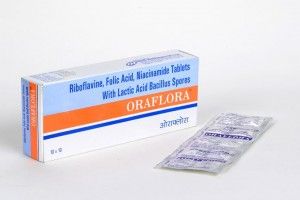ORAFLORA TABLET
Composition
Each uncoated tablet contains:
| Riboflavin | 10 mg |
| Folic acid | 1.5 mg |
| Niacinamide | 100 mg |
| Lactic acid Bacillus spores | 60 million |
Riboflavin (Vitamin B2)
Riboflavin is a water-soluble B vitamin which functions to help body cells create energy from the metabolization of carbohydrates, protein, and fat..
A deficiency will primarily manifest in the skin and in the mucous membranes. The initial symptoms of a deficiency are a sore throat and the appearance of sores and cracks located at the corners of the mouth. General characteristic signs of a vitamin B2 deficiency can include lesions on the skin (particularly at the corners of the mouth), and a sore, red, or burning tongue. As symptoms get worse, the tongue and throat may become a swollen or inflamed.
Niacinamide (Vitamin B3)
Niacinamide is a water-soluble B vitamin that plays a role in at least fifty different metabolic functions, which are all critical in the conversion of carbohydrates into energy.
A deficiency of Vitamin B3 (Niacin) can result in Pellagra. The primary symptoms of Pellagra include:
Skin problems including dermatitis, skin lesions on the face, arms and hands, and inflamed skin.
Mouth problems including canker sores, mouth irritation, and ulceration or swelling of the tongue.
Digestive problems including diarrhea, nausea, vomiting, and poor appetite Mental impairment including disorientation, dementia, depression, irritability, and emotional instability.
Folic Acid (Vitamin B9)
Folic acid functions as a coenzyme during the synthesis of DNA. It is also a vital component for cellular division, and the normal growth, development, function, and reproduction of all cells. Folic acid plays a role in all processes that depend on cell division. It is also required for protein metabolism and in treating folic acid anemia. Folic acid also assists in digestion, and the nervous system, and works at improving mental as well as emotional health. This nutrient may be effective in treating depression and anxiety.
Poor dietary intake of folic acid can result in growth retardation, macrocytic anemia, glossitis, and gastro-intestinal disorders.
Lactic Acid Bacillus (Lactobacillus Sporogenes)
Lactobacillus Sporogenes is a friendly bacterium, naturally occurring in the intestine. It is a spore forming bacteria that makes it the choicest probiotic with enormous clinical applications.Lactic acid bacillus when administered orally, are activated in stomach due to low pH of acidic gastric juice, moisture and mechanical churning action of stomach. The spores coat swell and enlarge in size. Their water content increases and the rate of metabolic process rises. While proliferating in intestine, they provide of viable lactobacilli which are capable of setting down in the intestinal tract and produce much lactic acid and antagonizerBacteriocines. Lactic acid bacillus is capable of protecting from pathogenic invasion into intestinal tract.
Indications
- Stomatitis
- Cheilosis
- Glossitis
- Pellagra
Dosage & Administration
Adult –1 tablet b I d for 5 to 7 days for the treatment of stomatitis,glossitis and cheilosis.
Children –1 tablet o d for 5 to 7 days.
Presentation
Strip of 10 tablets, box of 10 strips


